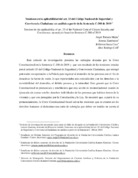Mostrar el registro sencillo del ítem
Tensiones en la aplicabilidad del art. 33 del Código Nacional de Seguridad y Convivencia Ciudadana: un análisis a partir de la Sentencia C-308 de 2019
| dc.contributor.advisor | Coll, Alex Rodrigo | |
| dc.creator | Mejía, Angie Tatiana | |
| dc.creator | Zambrano, Jimena | |
| dc.creator | Isaza Cruz, Jefferson | |
| dc.date.accessioned | 2022-05-23T15:50:48Z | |
| dc.date.available | 2022-05-23T15:50:48Z | |
| dc.date.created | 2022 | |
| dc.identifier.uri | http://hdl.handle.net/20.500.12237/2309 | |
| dc.description | Este artículo de investigación presenta las subreglas dictadas por la Corte Constitucional en la Sentencia C-308 de 2019 y que son resultado de las tensiones creadas por el artículo 33 del Código Nacional de Seguridad y Convivencia Ciudadana, que entregó potestades excepcionales a la Policía para ingresar al domicilio de las personas con el fin de desactivar la fuente de ruido, lo que representaba una contradicción con los derechos a la inviolabilidad del domicilio, el debido proceso y la intimidad. Esto generó que la Corte Constitucional se pronunciara y estableciera que esta acción es inconstitucional cuando es ejecutada sin contar con los derechos individuales de las personas que habitan dentro de la vivienda y que son protegidas por la Constitución y la Ley. Se encontró que, a partir de su pronunciamiento, la Corte Constitucional buscó salvar las tensiones que se crearon en los derechos humanos al dictaminar una serie de subreglas que deben ser tenidas en cuenta al momento de ejecutar este tipo de operativos, determinando que la actividad de policía debe en todo caso garantizar los derechos de los ciudadanos. | spa |
| dc.description.abstract | This research article presents the sub-rules issued by the Constitutional Court in Sentence C-308 of 2019 and which are the result of the tensions created by article 33 of the National Code of Citizen Security and Coexistence, which gave the Police exceptional powers to enter the people's domicile in order to deactivate the noise source, which represented a contradiction with the rights to the inviolability of the home, due process and privacy. This is why the Constitutional Court ruled and established that this action is unconstitutional when it is executed without counting on the individual rights of the people who live inside the house and who are protected by the Constitution and the Law. Its ruling, the Constitutional Court, sought to save the tensions that were created in human rights by ruling a series of sub-rules that must be taken into account when executing this type of operations, determining that the police action must in any case guarantee the rights of the citizen | spa |
| dc.format.mimetype | application/pdf | spa |
| dc.subject | Convivencia ciudadana | spa |
| dc.subject | Derechos fundamentales | spa |
| dc.subject | Corte Constitucional | spa |
| dc.subject | Actividad de policía | spa |
| dc.title | Tensiones en la aplicabilidad del art. 33 del Código Nacional de Seguridad y Convivencia Ciudadana: un análisis a partir de la Sentencia C-308 de 2019 | spa |
| dc.subject.subjectenglish | Citizen coexistence | spa |
| dc.subject.subjectenglish | Fundamental rights | spa |
| dc.subject.subjectenglish | Constitutional Court | spa |
| dc.subject.subjectenglish | Police activity | spa |
| dc.rights.accessRights | info:eu-repo/semantics/openAccess | spa |
| dc.creator.degree | Abogado | spa |
Ficheros en el ítem
Este ítem aparece en la(s) siguiente(s) colección(ones)
-
Derecho [4]

